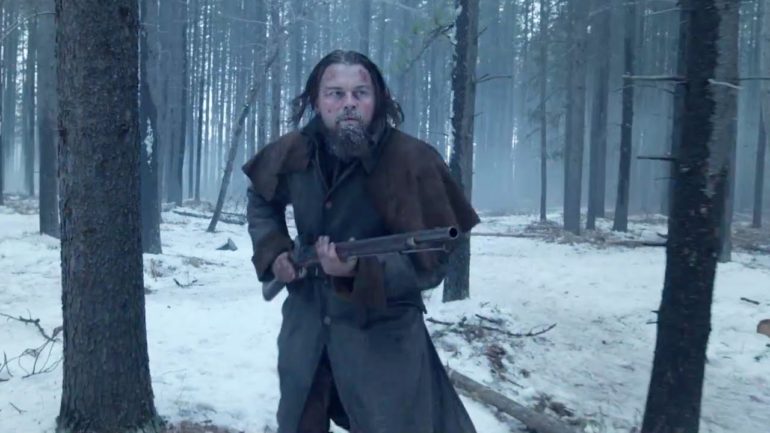Having garnered four awards at last year’s Oscars, including Best Picture and Direction, Alejandro González Iñárritu follows Birdman (or The Unexpected Virtue of Ignorance) with The Revenant. Set in 1820s Montana and North Dakota, tensions rise and violent breakouts increase between the indigenous tribes and foreign traders. A hunting party of trappers and hunters led by Captain Andrew Henry (Domhnall Gleeson, our Irish lad whose star is flying high and fast) are ambushed by Native Americans. The party, which includes Hugh Glass, John Fitzgerald and Jim Bridger, played respectively by Leonardo DiCaprio, Tom Hardy and Will Poulter, make their way back to the outpost until Glass is attacked and gravely injured by a bear. When carrying Glass’s body starts to considerably delay and endanger the men, he is abandoned. To get to safety, Glass must not only endure the harsh conditions of the wilderness but also survive (Cliché alert!) the greed and cruelty of man.
While the one-take-long style of Birdman has been abandoned, much of Emmanuel Lubezki’s cinematographic style from the former film remains, including his frequent use of long takes and close-ups, and creation of an ensemble performance through switching focus from one character to another (which is particularly evident in the opening battle sequence). While the human characters are the visual focal point, one can still appreciate the natural beauty of West North America within the panoramic shots. However, the insertion of Glass’s dreams and hallucinations add nothing to the plot, are not particularly interesting visually, and seem overindulgent.
The bear maul scene that has become synonymous with the film is brief but brutal, and DiCaprio’s cries are agonising. Herein lies the core of the lead’s performance – he aptly plays the hardships of physical and mental survival in the harshest of conditions in a merciless landscape. But this is also problematic. Aside from his ability to survive and navigate the terrain, Glass as a character lacks any qualities that are so extraordinary that he is worth saving (although one could always argue that in such a setting, those are the only qualities that matter). There seems to be a heavy reliance on his star status as Leonardo DiCaprio in the development of sympathy for the character. Whenever he is in a group setting, Glass merely blends into the ensemble, so the effort his men take in trying to rescue him over other members of their team is unconvincing. It could therefore be argued that, in spite of rumour, DiCaprio’s performance should not garner an Oscar when there is so little of interest in the actual role he plays. One has only to consider that the last five actors who won the award played the King of England, a silent film star, the President of the U.S., an AIDS patient and a ground-breaking scientist for examples of this.
Hardy’s character is also atypical and poorly written, and in spite of having shown himself time and again to be a worthy actor, here he never really convinces the audience that he is a menacing villain. From the very beginning, conflict feels forced, and once it transpires that the film is little more than a long, dull adaptation of the revenge western, the impression The Revenant leaves is very faint.

